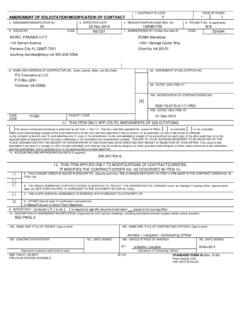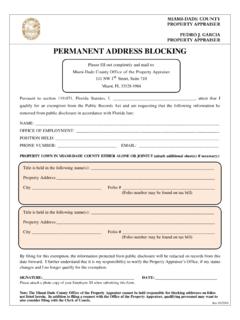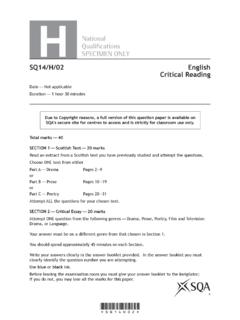Transcription of SAFLII Note: Certain personal/private details of …
1 SAFLII Note: Certain personal / private details of parties or witnesses have been redacted from this document in compliance with the law and SAFLII PolicyREPORTABLEIN THE HIGH COURT OF SOUTH AFRICA(NORTH GAUTENG HIGH COURT, PRETORIA)CASE No. 23010/2004 DATE:20/04/2011In the matter between:-MOLOKE BENNET PITSI No. 51561/2010 MOLOKE BENNET PITSI der Byl, AJ:-Introduction[1] This is a joint judgment in the above two matters, Case No. 23010/2004 and Case No. 51561/2010, both of which served before me on 24 February 2011, 25 February 2011 and 28 March 2011.[2] It is common cause that the parties were married to each other during 1994 and that a child, N D ("the child'), was born out of their marriage on 21 June 1997.[3] The parties were, after the Respondent together with the child left the common home on 18 May 2004, divorced on 6 March 2008 on the occasion of which a deed of settlement concluded between the parties was made an order of Court in terms of which, inter alia, primary residence of the child was vested in the Respondent and Certain rights of contact with the child were granted to the Applicant as the father of the child.
2 [4] The two matters before me are a sequel to a protracted, unfortunate and bitter, if not tragic, history during which six court orders were during the period 7 March 2006 to 25 February 2011 granted against the Respondent in terms of which she was in effect ordered to allow the Applicant contact with the child.[5] The six order concerned orders were granted on 7 March 2006 by Patel J, on 9 May 2006 by Murphy J, on 6 March 2008 by Shongwe J, on 12 August 2010 by Mavundla J, on 7 October 2010 by Webster J and on 25 February 2011 by myself.[6] As will be pointed out below, the Applicant was, despite these orders, during a period of almost seven years, apart from sporadic telephonic contact, allowed some contact with the child on only three occasions, namely, unsupervised on 21 June 2009 and, on the insistence of the Respondent, in her presence on 20 August 2010 and 21 August 2010.[7] In Case No. 23010/2004 the Applicant seeks, against the background of, according to him, numerous futile attempts to obtain reasonable access to the child, an order, in addition to the usual order of costs, in terms of which the aforesaid deed of settlement is varied so as to vest primary residence of the child in him.
3 [8] In Case No. 51561/2010the Applicant seeks, based on the Respondent's failure or refusal to comply, particularly, with the court order granted by Mavundla J on 12 August 2009, an order, in addition to the usual order of costs, in terms of which the Respondent is found to be in contempt of Court for non-compliance with that order.[9] The allegations on which such relief are claimed in these matters are in many respects disputed by the Respondent which call for a full and extensive exposition of the facts and allegations relied upon by the parties in support of, and in opposition to, the relief so claimed.[10] As will be pointed out below, the evidence in Case No. 51561/2010 ("the contempt application") is a continuation and part of the events referred to in Case No. 23010/2004 ("the variation application").[11] I will accordingly jointly deal with all the evidence as it emerged from both matters.[12] I will deal seriatim with the circumstances under which each of the six orders in question was under which the various orders were granted[13] Firstly, there is the interim order granted by Patel J in terms of Rule 43 on 7 March 2006.
4 [14] According to the Applicant -(a) he, after the Respondent left the common home, issued a summons against her for divorce under Case No. 23010/2004 in which he claimed, in addition to a decree of divorce, an order that custody and control over the child be granted to the Respondent subject to his right of reasonable access to the child, and the Respondent in turn claimed, as was evident from her plea filed in the divorce proceedings, an order that such access should be supervised "as she may alloW (para 5 and 6 of Applicant's founding affidavit in the variation application, record pp. 8 and 9);(b) the Respondent since she left the common home refused to give him her home address and furthermore refused him any contact with the child and even took a cell phone away which he had given to the child so as to maintain telephonic contact with the child (para 7 and 12 of that affidavit, record pp. 9 and 12);(c) he then, on advice of his attorney, awaited a report from the Family Advocate who interviewed him and the Respondent on one occasion whereafter the Respondent, despite various requests by the Family Advocate, failed to attend any further interviews and to make the child available for such interviews so that the Family Advocate had eventually to interview the child at his school (para 8 of that affidavit, record p.)
5 10 and Annexure A, record p. 34);(d) the Respondent, on receipt of the Family Advocate's report on 30 November 2005 in which, in order to guard against parental alienation, the Family Advocate recommended reasonable access, including removal rights every alternate weekend and school holidays and telephonic contact, still refused him contact with the child (para 9 to 11 of that affidavit, record pp. 10 to 11);(e) he then brought an application in terms of Rule 43 in which he claimed an order granting him reasonable access to the child, including removal rights every alternate weekend and school holidays, as well as the right to contact the child telephonically (para 15 of that affidavit, record p. 13).[15] The Respondent failed to file an opposing affidavit, but on 7 March 2006, being the date on which the matter was enrolled, counsel who appeared on her behalf requested, saying that the Respondent was unable to attend, a postponement, whereupon, the matter was then postponed sine die, but, as is apparent from para 16 of that affidavit, record p.
6 14 and Annexure B, record p. 45, Patel J granted the Applicant, in the interim -(a) the right to remove the child alternate weekends (commencing from the first weekend after the date of that order, ie., 11 March 2006);(b) the right to remove the child alternate school holidays (commencing from the first holiday after the date of the order), Christmas to rotate between the parties; and(c) the right to telephonic contact with a cell phone to be provided, as undertaken, by the Applicant.[16] Despite this order the Respondent still refused the Applicant any access to the child. She also failed to file an opposing affidavit, whereupon, the matter was enrolled for 9 May 2006 (para 17 of that affidavit, record p. 14).[17] In response to these allegations, the Respondent -(a) admitted that the Applicant issued summons for a divorce, but contended that she and the child were "expelled' by the Applicant from their home (para 9 of Respondent's opposing affidavit in the variation application, record p.)
7 70);(b) denied by way of a bare denial that she, after she left the common home, refused the Applicant any contact with the child and that she had taken the cell phone away from the child (para 11 of that affidavit, record p. 71);(c) denied also by way of a bare denial that she "simply did not go for the interview with the Family Advocate and contended, without stating why, that what was stated in the report of the Family Advocate was not the correct state of affairs and more particularly at the time she deposed to her affidavit on 11 August 2010 (para 13 and 15 of that affidavit, record p. 72);(d) denied by way of a bare denial that she, after the report of the Family Advocate became available, refused the Applicant any contact with the child (para 16 of that affidavit, record p. 73);(e) denied by way of a bare denial that she, after the order of Patel J was granted on 7 March 2006, refused the Applicant any contact with the child (para 23 of that affidavit, record p.
8 76).[18] Secondly, there is the final order granted by Murphy J in terms of Rule 43 on 9 May 2006[19] On 9 May 2006, in the absence of any opposing affidavit and on the Respondent's apparent failure to appear, Murphy J granted, as is apparent from para 17 of the founding affidavit in the variation application, record p. 14 and AnnexureC, record p. 46, a final order in terms of which the Applicant was granted the following rights of access to the child, namely -(a) to remove the child every alternate weekend (commencing the first weekend after the date of that order, being 13 May 2006);(b) to remove the child every alternate school holiday (commencing the first holiday after the date of that order, Christmas to rotate between the parties;(c) to have telephonic contact with the child by means of a cell phone to be provided, as undertaken, by the Applicant; and(d) reasonable visitation to the child.[20] As the Respondent was still refusing to disclose her residential address it was arranged, on her insistence, that the Applicant would collect the child at McDonald's, Randburg, for the first weekend envisaged in Murphy J's order (paras and of that affidavit, record pp.)
9 14 and 15)[21 ] According to the Applicant, the Respondent, however, on her arrival refused to hand over the child and drove away, but, as was later determined, instead went to the police station where she laid a charge against the Applicant accusing him of having threatened her with a gun. The Applicant described this allegation as a blatant lie and raised the question why he would have taken a gun to collect his child and why would he have attempted to take the law into his own hands after having followed a lengthy and costly legal process to obtain access to his child, particularly, where he had a court order in his favour (paras to of that affidavit, record pp. 15 and 16).[22] He was, according to him, later informed by the child that the Respondent told him to lie about the incident at McDonald's (para of that affidavit, record p. 16).[23] The Respondent in turn merely reiterated the allegations that she was threatened with a firearm and that she drove away because she was scared for her life and that of her child (para 25 of her opposing affidavit, record p.
10 76).[24] Thirdly, there is the order by Shongwe J (as he then was) on 6 March 2008.[25] According to the Applicant he was after the incident at McDonald's not granted any rights of access to the child, but at the pre-trial proceedings held with a view to the divorce, the Respondent conceded to supervised access to the child being the basis on which the deed of settlement was eventually concluded (paras and to of the founding affidavit in the variation application, record pp. 17 and 28).[26] In terms of the deed of settlement, Annexure D to that affidavit, record p. 47 -(a) custody of the child was awarded to both parties, but primary residence of the child was vested in the Respondent;(b) the Applicant was entitled to contact the Respondent telephonically to arrange a time, date and place at which to visit the child;(c) the Respondent was at all material times to be present during the exercise by the Applicant of his visitation rights.














